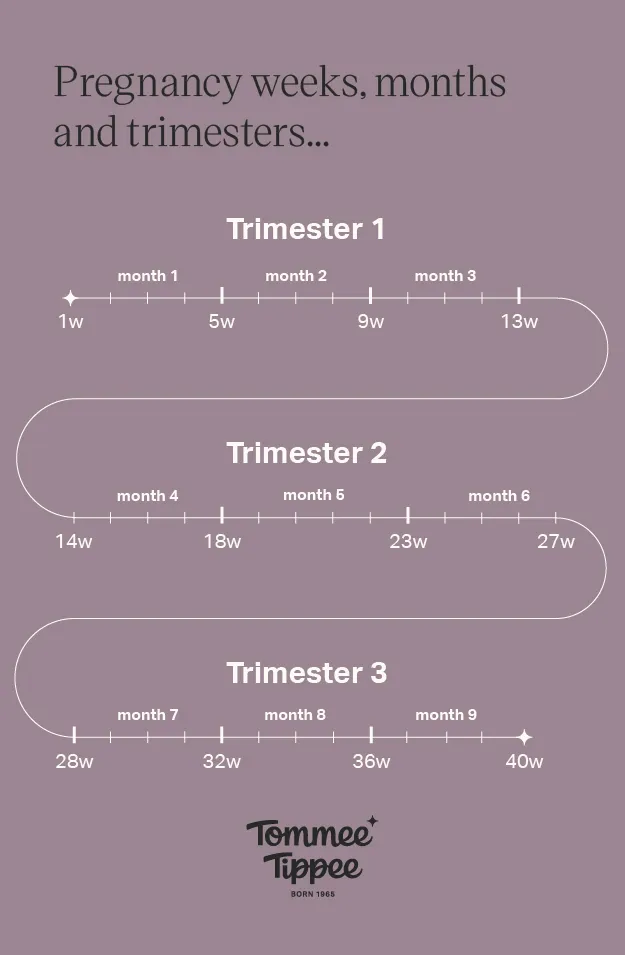
Ultimate XL Nappy Disposal Bundle with 18 Refills
Bundle & Save 40%
Subscription orders can be cancelled at anytime. Free delivery on all subsequent subscription orders. Find out more about subscriptions.
They’re easy and fuss free
Your products are automatically sent to you
You save up to 10% when you sign up for a subscription
You can cancel at any time

Pregnancy is an exciting time, but as your body goes through some big changes, it can also be confusing and overwhelming to keep track.
Although it can seem confusing at first, the easiest way to understand and track the process of pregnancy is to break it down into trimesters. These distinct phases provide a roadmap for monitoring your baby's growth and your body's changes.
Whether you're a first-time parent who is curious about the early days of pregnancy, eager to discover the excitement of the second trimester, or preparing for the final stretch leading up to birth, or you're a seasoned parent looking to refresh your memory, this guide will give you valuable insights and answer any questions you have about the trimesters of pregnancy.
A typical 40-week pregnancy is broken up into three trimesters, with the foetus and the expectant mother's body meeting certain development milestones during each of these. Understanding these trimesters is essential for monitoring a baby's growth, tracking the parent's health, and preparing for birth.
As well as the three trimesters of pregnancy, many people consider there to be a fourth trimester. This is the three months following birth, also known as the postpartum period.
There are 13 or 14 weeks per trimester, and this breaks down as follows:
You can work backwards from your due date to calculate how many weeks pregnant you are. Head to our due date calculator page to learn more.
Here's a basic look at how the weeks, months and trimesters of pregnancy are counted:

Now that we've covered how many trimesters there are, and how many weeks are in each, let's cover some of the key development milestones and changes that each brings.
Week one to 12 of pregnancy involves conception, implantation, and organ formation. It's during this trimester that an embryo transitions into the foetal stage, and its size increases significantly.
During the first trimester, you may experience symptoms like morning sickness, fatigue, breast tenderness, headaches, needing to urinate more, constipation, and mood swings. Remember to take things easy and get plenty of rest!
Week 13 to 27 of pregnancy is when most pregnant people start to feel their baby move as they start to kick and turn from side to side. Your little one will also start developing reflexes, like swallowing and sucking, and they'll now have fingernails!
This 'golden' trimester is usually when many pregnant individuals experience relief from the early pregnancy symptoms and generally feel more energised. But you may experience leg cramps, heartburn, and backache as your body changes to accommodate your growing baby.
Weeks 28 to 40 of pregnancy mark the final stretch in the run-up to a baby's arrival. During these months, they start to look more like the little bundle you expect to see at birth. They continue to put on weight, and by 37 weeks (full-term), their lungs will be ready to take that first breath.
During these late weeks, you may experience things like Braxton Hicks contractions, tightening or aches around your bump, and swelling in your ankles and feet.
The term "fourth trimester" is used to describe the first three months after a baby is born - a time that's critical for both baby and parents as they adapt to their new roles and routines.
It's based on the idea that babies are born relatively immature compared to other mammals and require continued care and support as they adjust to life outside the womb.
This transitional period brings various challenges including physical recovery from childbirth, hormonal changes, sleep deprivation, feeding difficulties, emotional adjustments, and the overall demands of caring for a newborn. New parents need to recognise that these challenges are normal and that it's ok to seek support if they're struggling.
Early pregnancy spans from conception to approximately 12 weeks gestation - a time also known as the first trimester.
During this time, you may experience various symptoms, such as missed periods, breast tenderness, fatigue, morning sickness, needing to pee more, and mood swings, although these symptoms can vary from one pregnancy to the next. Not everyone experiences the same symptoms, and some may not experience any symptoms at all.
To determine your current trimester and approximate due date, you can count the number of weeks from your last period to the present date.
If you're unsure about your trimester or need an accurate assessment, it's best to consult with a healthcare provider. They can confirm your stage of pregnancy and provide you with the appropriate guidance and care.
The first trimester is considered the most crucial period for a developing embryo/foetus and for prenatal care.
If you think you may be pregnant or have questions about early pregnancy, you should seek support from a healthcare professional for accurate information and appropriate care.